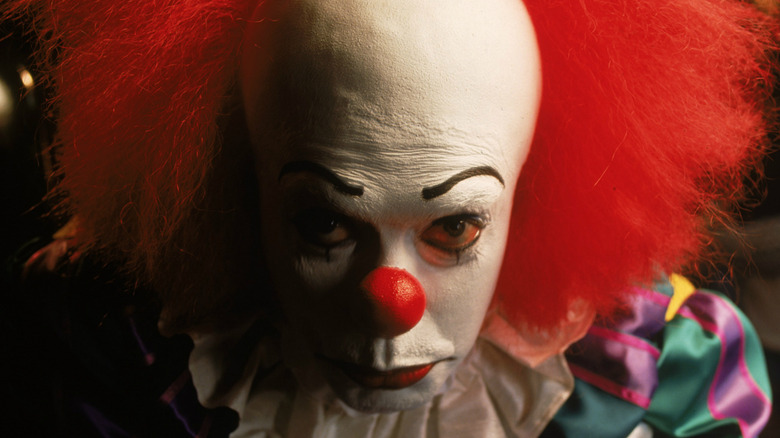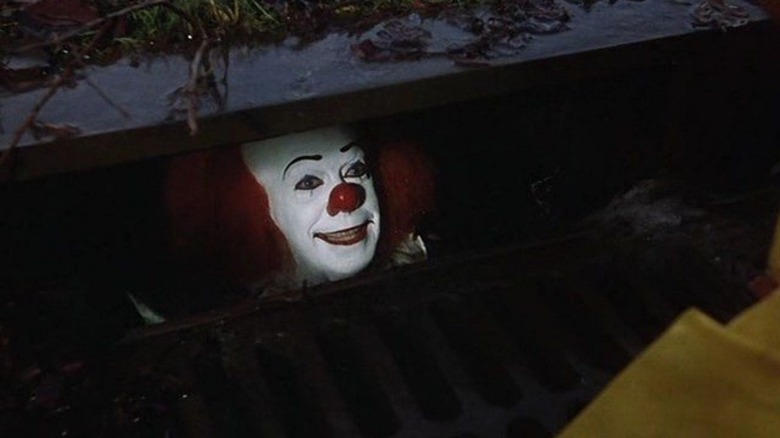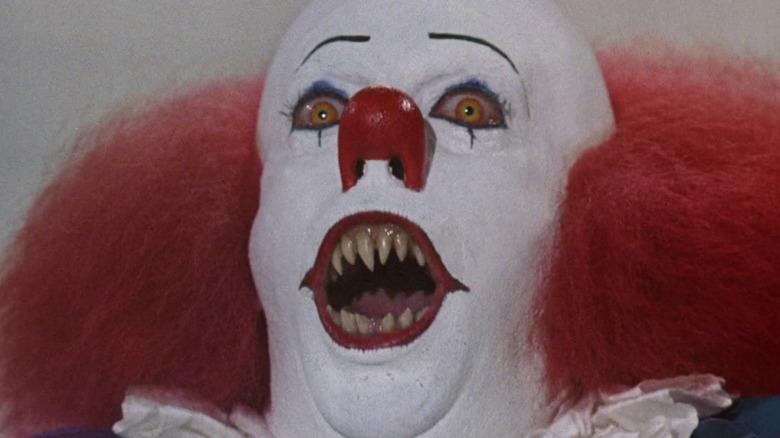Tim Curry Was Also Disappointed By The Ending Of It
Stephen King's 1986 novel "It" is the second longest he's ever written. It is only 14 pages shorter than the 1990 update of his 1978 novel "The Stand," and its prodigious length would rightly lead you to believe it is incredibly dense and eventful.
"It" tells the story of seven friends, all hovering around age 12, who find their town of Derry, Maine is being periodically stalked by a vicious, monstrous clown that lives in the sewer. The clown is a seemingly supernatural entity that knows their deepest fears and can change its shape to match. It takes a great deal of joy tormenting its targets, and it will only occasionally eat them. The clown calls itself Pennywise.
The bulk of the book takes place in the 1950s, and in depicting instances of domestic abuse, bullying, and everyday hate, it serves as a commentary of the placid Rockwellian picture Americans tend to paint of suburban post-war America. In the 1950s, the friends ultimately gather up childhood totems — slingshots and the like — and confront the clown in the sewers under Derry. Fast forward to the 1980s, and the friends have all grown into unhappy, fearful adults, still living in fear that the childhood clown will eventually return. In the book, it's revealed that Pennywise is an ancient evil space deity that landed on earth centuries ago and has been going through 27-yearlong hibernation cycles underneath Derry, awakening to feed on the children.
In 1990, director Tommy Lee Wallace ("Halloween III: Season of the Witch," "Fright Night Part 2") adapted Stephen King's massive missive into a 190-minute, two-chapter miniseries starring, among others, Jonathan Brandis, Seth Green, John Ritter, and Harry Anderson. The first part of "It" took place in the 1950s, while the conclusion took place in the 1980s. Tim Curry plays Pennywise, in one of the actor's more notable roles in a career full of them.
It's It!
By 1990, Tim Curry had already gained a reputation for playing gloriously quirky characters, outsiders, and heavies. Curry's most memorable role is likely that of Dr. Frank-N-Furter in "The Rocky Horror Picture Show," but is just as well known for paying the evil Rooster Hannigan in John Huston's "Annie"; the devil himself, called Darkness, in Ridley Scott's "Legend"; and the prim and possibly murderous butler in "Clue." Curry's on-screen charisma was well known by the time he was cast as Pennywise.
Pennywise offered Curry an enjoyable acting challenge. A murderous shapeshifting clown from beyond the stars leaves open a lot of possibilities. In a 2017 interview with The Guardian, Curry revealed the research he did for the role and how he came to an abiding understanding of what function Pennywise played in the lives of the youthful protagonists. He had read a lot of Stephen King before, so didn't have a lot to catch up on:
"I'd read most of his books before doing 'It'; he's such a great storyteller. I love that he is more likely to quote Springsteen than Shakespeare. He's got a great sense of how children think and speak. And a feeling for landscapes. I think he knows that everyone is vulnerable to something. I haven't met him. I wish I had."
It's not too late. Curry is only 76 and King is 74. Perhaps a meeting of the two geniuses can still be arranged.
What is It?
Like all sane people, Tim Curry also knows that clowns are naturally scary. He was so scary, in fact, that he frightened one of his young costars. He continued to The Guardian:
"I read 'It' when I got the role and I thought it was wonderfully scary, because clowns are scary. It's the exaggeration. Pennywise always understood what each character was scared of, and provided it. And I could see what fun it would be to be that scary. They came up with such a great makeup. There's the classic scene where little Georgie floats his paper boat down the gutter and puts his hand down to try and get it back, and is grabbed by Pennywise, who says: 'Down here we float!' The boy playing Georgie [Tony Dakota] yanked his hand away and said, 'You're scaring me!' I said, 'I'm sorry, I'm supposed to.'"
The denouement of Stephen King's opus involved Pennywise transforming into its true form, that of an enormous spider. Many fans of the book, including Curry himself, feel the ultimate form of Pennywise is a little bit of a letdown. The insidious surreal quality of a clown in the sewer is a nightmare image, something a child would imagine and fear. A giant spider is perhaps a little too direct. Additionally, a giant spider is a difficult special effect to film, and the spider in the 1990 miniseries simply looks ... off. Said Curry:
"I was very disappointed by the ending, when I turned into a rather unconvincing spider. But some people are obsessed with Pennywise. I went out to dinner last night, and I'm currently in a wheelchair because I had a stroke five years ago. And a guy saw me and stood up and said, 'I've seen the original Pennywise!' And I said, 'Well, good for you.' I think whatever scares the pants off you when you're a child is an image that always stays with you."
If scaring the pants off of children is the requisite for staying entrenched in a person's mind, then Curry occupies the mind of an entire generation.


